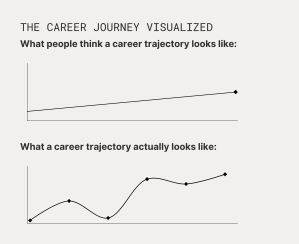When we tell stories of successful people, we often bypass their failures — or at least it feels that way. The reality is, everyone fails. A true inflection point lies in how that failure is addressed.
Career rejection follows a similar pattern — it is not something to avoid, but instead something to embrace. In fact, many positive career outcomes are a product of rejection.

Though there is no way of knowing how and when rejection will strike, we can almost be certain that it will. Because of this, we encourage job seekers and career explorers to set realistic expectations.
In the ever-evolving professional landscape, it’s crucial to acknowledge that the path forward is not always linear. Career trajectories often involve taking steps backward in order to surge forward later.
This understanding is shared by many professionals. Exploring career rejection and how to make the most of this non-linear journey, we gathered insights and advice from those who have experienced it firsthand. You will find their stories, advice in their own words, and curated tips on rejection below.
Five tips to overcome career rejection
Although there is no golden rule for facing rejection, there are numerous ways to overcome it. When a rejection happens, it is important to observe, accept, and learn from it. Here’s what experts recommend:
- Understand that this is common. People get rejected every single day. Sometimes for things they are especially qualified for. Take each rejection on the chin, and know that the right thing will come with time.
- Know your why. You applied to the position or asked for that raise for a reason. Remember that. The best way to have others recognize your talent, worth, and abilities is to believe in them yourself.
- Self reflect. Rejection provides a great opportunity to check yourself and what you are putting out to the world. Review and reinforce your career materials. Make sure that your personal brand, profiles, and resume reflect what you want and what you are good at.
- Keep your options open. Flexibility and intentionality are key when navigating a career. If rejected, follow your gut and keep an open mind. You might unlock opportunities that you never knew existed.
- Fight the urge. When you hear “no,” it is natural to place blame on yourself and others. Yes, accountability matters. But don’t dwell on losses or failures. Hold your head high and look forward to what the future holds.
Tales and tips of rejections past
Sometimes, it takes a “no” to lead you in the right direction. For many industry professionals this rings especially true. Hear from a few employer partners and alumni as they discuss the rejections they have faced, how those led to where they are today, and what advice they have for others along the career journey.
Jessica Lucas
Jessica Lucas is the current director of Talent and Culture at Risk3sixty. After receiving her undergraduate degree from West Point Military Academy and serving the country for ten years, Lucas knew she wanted to make a change. Her expansive background now helps her to understand the needs of others within her company as they navigate their own career journeys.
To hear Jessica’s advice, listen below.
You’re going to get rejected. I say it’s like dating. I have quotes and I have a vision board or mission statement that I carry with me because those are reminders for myself, right? That nothing that you want comes easy, right? Something that’s worthwhile never comes easy. It takes work. I remind myself: why did I start this journey? Having a mission statement that I crafted before all this started, it reminds me why it’s worth it. Why the journey is worth it. And I will tell you, I never looked back.
Remember why you started it and keep whatever it is. Whether it’s a vision board. Maybe it’s just a picture from a magazine, or it’s a quote from someone that you respect or just inspires you. I think you need reminders. A lot of individuals tend to undermine themselves. And I think it’s because it’s the unknown and you get defeated after being rejected so many times. It kind of impedes on your confidence. But I think you have to remember why you started this journey and like what you have to bring to the table and be confident.
Honestly, in our environment, in any industry, I feel like we have to stay agile right now. Right? Things can change tomorrow. That’s the way that the world works right now because we’re hyper connected.
So I think those are the things that we [Risk3sixty] look for. And [what] I would always keep in mind when you are looking or when you do your interviews is: don’t forget who you are yourself. Because I think we get lost throughout the process.

Donzel Lawson
Donzel Lawson is a graduate of the Digital Marketing Boot Camp at the University of North Carolina at Chapel Hill. He currently works as a Paid Search Associate at Wavemaker US, specializing in search engine optimization (SEO). With a robust customer service background, Lawson is no stranger to career change and, thus, no stranger to rejection.
To hear Donzel’s experiences, listen below.
Oh yeah, rejection definitely happens and it’s going to happen. You know, even after graduation and even directly after graduation.
I had a short interview with a position that I applied for. The woman that I initially talked to — you know, it was, once again, a short interview — but we were able to get through the questions and she seemed somewhat enthusiastic about passing my information over to her boss. I get on the phone with her boss, you know, maybe 2 to 3 minutes, and he says, ‘Oh, well, I can see this isn’t going to work out. I’m not going to waste my time, not going to waste yours. I hope you have a nice weekend.’ And that was that.
So that’s probably like the worst rejection I have had career-wise and that was recently after graduating, but it happened. I wouldn’t have had the same motivation had I not been rejected. If it was that easy, I probably would have fallen into whatever I thought was best for me at the time instead of going through and really applying. Really making sure that I have the portfolio looking the way that it needs to look and all of those things that we did learn when it comes to SEO. Applying that to my portfolio. Making sure that the file names for the pictures are in line with what the picture is supposed to be. All of those small things that you learn in SEO, making sure that that’s where it needs to be.
Shareese Kess
Shareese Kess is a certified case manager, licensed clinical social worker, and the current director of Community Based Program Development and Engagement at TIME Organization. She has been in social work for over twenty-three years and has worked in every sector under the sun — from therapy to case work. Kess’s background in behavioral health has allowed her to establish healthy habits throughout her own career. She now uses what she’s learned to support family and friends with obstacles like rejection and imposter syndrome.
To hear Shareese’s story, listen below.
Understand that it’s a process. You don’t want to put you in a position you’re not totally prepared for. You don’t want to get there and be stuck and overwhelmed and feel like this is something that I [you] can’t manage.
Within that gap of time of finishing school and obtaining the job that was my internship, I interviewed a few times and they were not all successful. So I had to do some fast food, some retail, and things like that to fill in the gaps.
But, I remember I interviewed for an organization called Almost Family, and I’m feeling great because I have this bachelor’s degree and I go in and I interview. I have the volunteer experience, I have the internship experience, and they’re telling me — they’re giving me scenarios of: ‘What would you do with this challenging person? How would you deal with it?’ I had experiences in the community and I actually discussed those experiences, but they wanted to know a professional experience, not a personal one, and I didn’t have one to give them. So, I was told that I did not get that job. They went with someone who was a little more experienced [professionally].
It didn’t discourage me too much because, you know, I knew my skill set and I knew something would come. But it did make me feel bad that my first interview didn’t go well.
But everything has a season and maybe it’s not time for that, now. You feel like it’s time, but it may not be time. Maybe if you got it [that position] now, you got that certain job that wasn’t really within your path, [then] you wouldn’t go be where you’re supposed to be in the next few years.
So, I think [it’s all about] remaining hopeful and knowing that not everything is a good fit. Just being patient with yourself and knowing that the right fit is going to come. And that if everybody said yes, you wouldn’t be at the place that you’re supposed to be. [All of this] Kind of helped me to get through that [rejection]. And again, just relying on others who had graduated and also had experienced, kind of the same thing. [I think] That relatability really helped me as well.
As far as employment goes. My oldest daughter, who is also an LCSWC, like me, she’ll be 30 in September. She experienced some rejection once she received her master’s degree. And she was ready to kind of jump out there and make a better salary. It was one of those things where it was a really competitive market for master’s social workers. And most of them — she obtained her MSW — but most of them had their LCSWC. So, for her, it was a matter of having her be patient and [telling her to] appreciate where you are now and all the knowledge you’re getting now, so that when you are in a position for a promotion, you will get it. And now, she’s a therapist, she’s a supervisor. So it was a matter of just letting her know [that] you have to trust the process. You know, you may be on paper eligible for a promotion, but do you really have the experience and the skills for that?

Tom Reino
A few years ago, Tom Reino realized that his career in the travel industry was not allowing him the time, space, or energy that he needed to be present in life. So, when COVID-19 hit, he decided to make a big change. Reino is now a Boot Camp graduate of the University of North Carolina at Chapel Hill and a SCRUM program manager for Comcast. Finally on the other side of the hill, he is able to reflect on his pivot, run-ins with rejection and imposter syndrome, and more.
To hear Tom reflect on his experiences, listen below.
Rejection’s scary, you know? Like, what’s more scary than putting yourself out there to say, ‘Hey! check me out. I can do so much good for you based on what I know and what I’ve experienced in life.’ Only to just get that email that says, ‘Thank you. We’ve found someone else.’ And you’re like, ‘Oh, all right, great.’ And then that’s all you get. And it’s just constantly streaming your way because you’re just plugging away at [applications] seeing who wants you the most. And then it’s like, ‘Wow, no one.’ And it’s hurtful, you know?
But it’s not the end. There is someone out there who will see value in what you can offer to their organization.
Winners lose more than losers lose because the winner keeps going. So there is that organization, there is that group, there is that other person out there who wants what you have to offer. You just haven’t found them yet, or they haven’t found you.
Vesna Tertei Rudinski
Just before the start of the COVID-19 pandemic, Vesna Tertei Rudinski relocated to the United States with her family. This move did not come without challenges. Now the chief operations officer (COO) and co-founder of GG Hive, a custom product and software development company based in San Francisco, California, she understands that embracing the “nos” can open unexpected doors. Read more on Tertei Rudinski in Using rejection as motivation: One woman’s pivot into entrepreneurship.
To hear Vesna’s advice, listen below.
A rejection is harder as you go deeper.
I had, like, seven interviews with all kind of [people], with HR, with some tech people, engineers and business developers, et cetera. And after the last round there was one other person and me, like, the two of us, and they decided to go with the other person. Because you’re so deep in the process, you feel like I got the job. So that was like a three month process. So [it was like] we knew each other. We [the recruiter and I] talked like friends already and everything. I was so relaxed I thought, ‘I got this job.’
But no, I didn’t. I was a little bit emotional about that.
Of course, I was rejected while I was in the boot camp. So, when that person asked me, when my business partner asked me, am I open to that sort of business relationship, that rejection helped me to be braver. Because, if that didn’t happen, I’m not sure that I would be brave enough to go into something like this [entrepreneurship]. Because, like you know, every company, when you start, is not profitable. Everything you earn, you have to give back to the company for marketing, for business development, for networking, for emails, whatever… So you have to be ready for that sacrifice and a lot of time, but you earn very little. It’s hard to go that way, but that rejection helped me to be brave.

Ready to overcome rejection yourself? Learn more about what employers are looking for in your industry via our Salary negotiation guide or LinkedIn profile guide.




